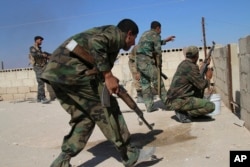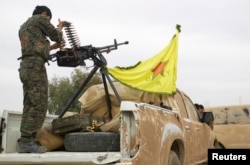U.S. officials say they can see no strategy behind Russia’s military intervention in Syria, just short-term buttressing of President Bashar al-Assad’s faltering armed forces that will fail and trap Moscow in a quagmire. Syrian opposition politicians, however, worry the Kremlin’s strategy is to maneuver the West into endorsing a peace plan that would end the Syrian revolution – and possibly lead to the breakup of Syria.
In interviews with VOA, several opposition leaders said they fear Western fatigue and U.S. wariness over escalation will lead Washington and the European powers to agree on a peace deal, secured under pressure from the Russian military intervention, that would see the long-term survival of Assad’s authoritarian regime in Damascus.
At root is the question of whether Assad would remain to oversee a political transition – a short-term solution that could quickly stretch into a long-term one, Syrian opposition leaders suspect.
"What is the purpose of Assad staying for a transitional period?" asked Ahmad Tu’mah, the prime minister of the Syrian Interim Government that was set up by a coalition of Western-backed opposition factions.
"How can a person who has murdered Syrian people have a role in peacemaking? What are the guarantees that he will not stay for a longer time than a transition? The regime wants to stay forever," he said in an exclusive interview with VOA. "The Russians need to accept there is no future for Assad."
Opposition leaders wary
Making opposition leaders anxious is the shift they perceive in Western resolve about whether Assad would have to go before a transition and play no further part in governing the war-wracked country.
"I am worried we will be presented with a fait accompli," said General Salam Idris, a senior figure in the Western-backed Free Syrian Army. He said many ideas are being considered by Western officials — including partitioning Syria along sectarian and ethnic lines. Parts of the country could be apportioned among Sunni Muslims, Kurds and Alawi, Assad’s minority sect, an offshoot of Shia Islam.
Western leaders waver
Since Russia’s military intervention in Syria, Western leaders have wavered over Assad's immediate personal future.
"The few European leaders still holding a strong line on the necessity of Assad’s ouster appear increasingly isolated," noted Benjamin Haddad and Hannah Thoburn, foreign policy scholars at the Hudson Institute, a research organization.
Britain's Prime Minister David Cameron has gone back and forth, calling for Assad’s departure but undercutting his demand by saying, in a September 29 interview, that the Syrian autocrat might be able to stay and play a transitional role. The U.S. position has also appeared to shift, with U.S. Secretary of State John Kerry saying, on September 19, that Syria's president has to go, but the timing of his departure should be negotiated.
As far as Syrian opposition leaders are concerned, Assad’s departure isn't a matter of debate.
They point out that under the Geneva Communique, the internationally agreed-upon road map for a Syrian political transition, they have the right to object to any names put forward to serve in a temporary post-conflict government. So does the Syrian government.
And, said Ahmad Tu'mah, "We clearly object to Assad."
Anxieties persist
Tu'mah drew some reassurance from U.S. President Barack Obama’s speech last month at the annual meeting of the U.N. General Assembly. He excoriated Assad, saying, "There cannot be, after so much bloodshed, so much carnage, a return to the prewar status quo."
Yet there was alarm, too, among opposition leaders when Obama added, "Realism also requires a managed transition away from Assad and to a new leader." They argue a transition can only begin when Assad has gone, otherwise it won’t be a transition.
Meanwhile, the more discussions occur between Kerry and his Russian counterpart, Sergei Lavrov, the more anxious the leaders of the armed and political wings of the rebellion become.
State Department spokesman John Kirby told reporters in Washington on Friday that Kerry and Lavrov would continue to hold discussions and talk with "Arab and our European allies and partners about the modalities of what a political transition could look like going forward."
"At the very highest levels here at the State Department, a political track is being pursued," Kirby said.
Political solution uncertain
Rebel leaders are suspicious, though, and say they place little faith at the moment in a political solution. Their alarm has also increased with Moscow’s courting of the Syrian Kurdish separatist group on which the U.S. has relied as an ally in the fight against Islamic State extremists.
The leftist group, the Democratic Union Party, or PYD, which has old ties with Moscow, has grown increasingly frustrated with the lack of Western backing for its ambition to carve out an independent Kurdish state along the border with Turkey.
There is rising suspicion among leaders of the mainly Sunni Arab Free Syrian Army, or FSA, that the Syrian Kurds may be ready to work with Russia – or use the threat of doing so to persuade Washington to endorse Kurdish autonomy in northeast Syria.
In an October 1 interview with news site Al-Monitor, PYD leader Salih Muslim appeared to suggest his group may be seeking a strategic alliance with Assad and Russia in order to achieve autonomy. He said that if Turkey attempted to halt Kurdish ground movements aimed at carving out an independent state, Russia could "prevent Turkish intervention not to defend us [Kurds] but to defend Syria's border."







